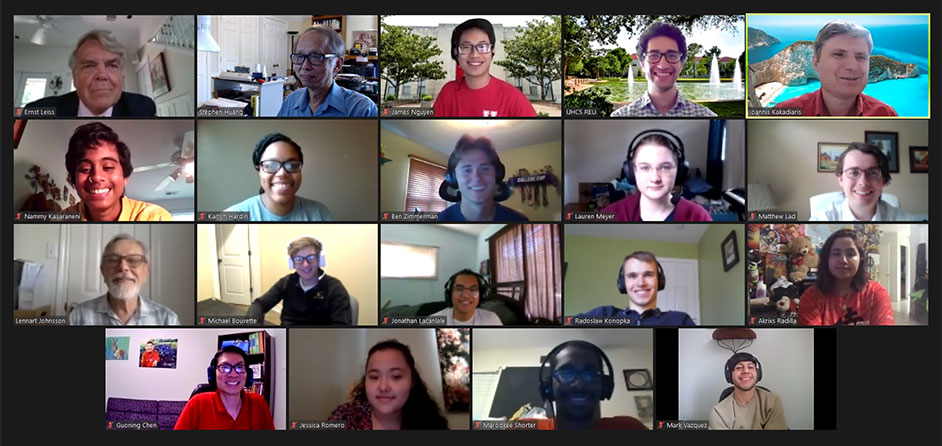Students Worked on Projects Ranging from Data-Centric Privacy to Email Detection
For 15 years, the University of Houston computer science department’s summer Research Experience for Undergraduates has consistently taught students from universities across the country and piqued their interest in scientific research.

A global pandemic was a new challenge, yet the program maintained its high standards while moving completely online.
“Having such an experience requires building trust between the mentors and mentees,” said Ioannis Kakadiaris, this year’s program director and Hugh Roy and Lillie Cranz Cullen University Professor at the College of Natural Sciences and Mathematics. “We accomplished that by offering, in addition to the other program activities, ‘Ask Me Anything’ sessions, team building activities and virtual tours to Houston’s sights. We are very proud of what our mentees have accomplished and the adaptation that both mentees and mentors had to go through.”
14 Students from 13 Universities
The National Science Foundation-funded program offers a $6,000 stipend and, when it is offered face-to-face, room and board in Houston.
This year, the program ran from June 1 to August 7.
Participants came from 10 different states and a variety of universities, including: Austin Peay State University, California State University, Central Connecticut State University, Drury University, Georgia Institute of Technology, Indiana University, Samford University, Smith College, University of Houston, University of Houston–Downtown, Whitman College and Yale University.
The program is designed to give students experience in research and encourage them to pursue graduate studies. For 10 weeks, they are mentored by a UH computer science faculty member and shown what a graduate-level education and a career in research can look like.
As computer science professor Stephen Huang explains, this year the program organized a Graduate Study Workshop that included discussion of computer science careers, the graduate admission process and panel discussion on graduate school experience.
Teaching the Next Generation
Research projects ranged from data-centric privacy to video mining, to malicious email detection.
Participating UH computer science faculty that were mentors include REU program director Ioannis Kakadiaris, principal investigator Ernst Leiss, Rakesh Verma, Ioannis Pavlidis and Stephen Huang.
Almost all the students had individual research projects:
- Michael Bouvette, “Bio and Behavioral Feedback (B2-Feedback) in Transitional Vehicle Technology” (Mentor: Pavlidis)
- Jerred Chen, “Using Anomaly Detection to Differentiate Between Short and Long Chains” (Mentor: Huang)
- Kaitlyn Harden and Marodkee Shorter, “Parameterizing Facial Recognition Data to Protect Against Attacks through an Insecure Channel” (Mentor: Leiss)
- Nammy Kasaraneni, “Fake News Detection” (Mentor: Verma)
- Radoslaw Konopka, “Defending Against Adversarial Attacks on Email Classifiers” (Mentor: Verma)
- Jonathan Lacanlale, “Classification of Long Stepping Stone Connections” (Mentor: Huang)
- Matthew Lad, “Matching Connections Based on Packet Patterns” (Mentor: Huang)
- Lauren Meyer, “Biometric Transmission Protection Through Parametrization and Time-out Protocols” (Mentor: Leiss)
- Khuong Nguyen, “IDEATION: A Generalizable Video Annotation Tool” (Mentor: Kakadiaris)
- Akrixs Radilla, “Facial Images with Masks: Detection and Recognition” (Mentor: Kakadiaris)
- Jessica Romero, “Science of Science Convergence in Affective Computing” (Mentor: Pavlidis)
- Mark Vazquez, “Investigating Work & Stress Patterns” (Mentor: Pavlidis)
- Ben Zimmerman, “Anomaly Detection for the Class Imbalance Problem” (Mentor: Verma)
Adjusting to Online Learning
For some students, learning online meant increased productivity and figuring out new ways to communicate online, while staying safe during the pandemic.
“The primary advantage that I most enjoyed is understanding how to work from home,” said Jonathan Lacanlale, a student at California State University. “This isn't just focusing on programming or being proactive but also understanding how to handle online meetings and online networking, which seems like it will be a long-time trend due to COVID-19.”
The program also offered online team-building exercises that did not include mentors. Exercises included: Share A Picture/Share A Story, Cards Against Humanity, Pictionary and REU Got Talent. During these activities, the students were able to discuss general topics unrelated to the REU program and get to know each other on a personal level.
This year also meant all presentations, such as the midterm and final presentation, were online. Despite the benefits of learning online, students still greatly missed the face-to-face interaction.
“I believe the transmission of knowledge doesn't only take place through formal methods such as seminars or workshops,” said Jessica Romero, a student from Yale University. “But also, in everyday informal interactions. The lack of these informal interactions is the biggest disadvantage I see of an online program. Informal interactions can be limited online, meaning that you miss out on seeing the intricacies of research or the day-to-day of grad students. This type of observational information may change drastically people's perception of research and interest in pursuing a career in academia.”
For mentors, the online learning was a new adjustment as well.
Verma said moving the program online meant it can take “longer and more meetings to communicate properly and come to a mutual understanding of the concepts and tasks.”
Overall, program coordinator and UH Computer Science instructional assistant Ayman El Aassal said, “given the circumstances, I am glad that the program was not canceled. Even though it can’t be compared to a face-to-face experience, the program was able to offer to the students a great learning experience.”
- Rebeca Trejo, College of Natural Sciences and Mathematics